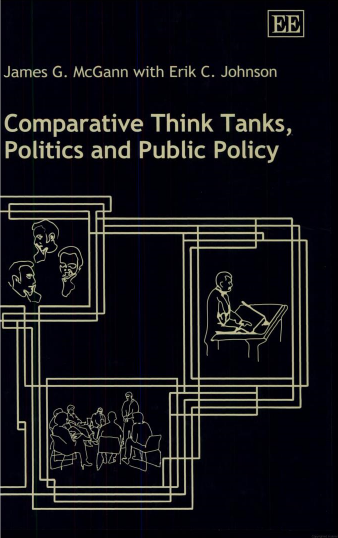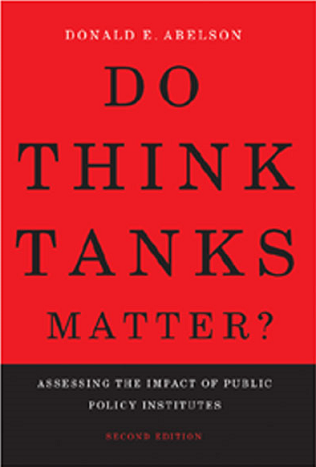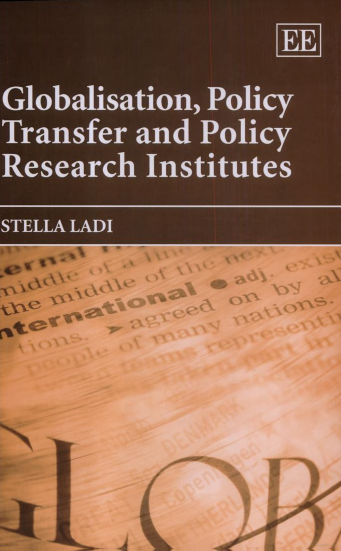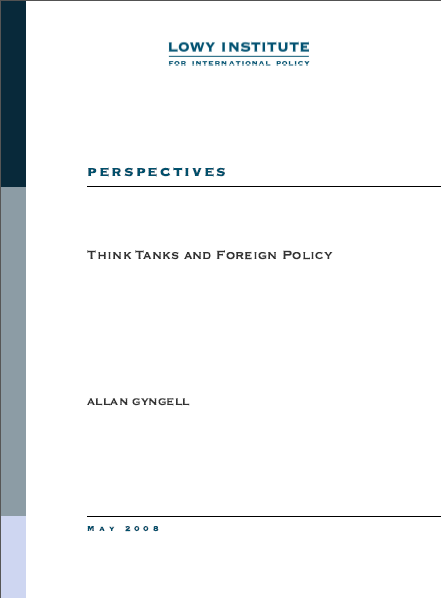
 Next Tuesday, September 20th, the Centre for International Governance Innovation (CIGI) is hosting a one-day conference under the provocative title, “Can Think Tanks Make a Difference?”, as part of its 10th anniversary celebrations.
Next Tuesday, September 20th, the Centre for International Governance Innovation (CIGI) is hosting a one-day conference under the provocative title, “Can Think Tanks Make a Difference?”, as part of its 10th anniversary celebrations.
When institutions celebrate such occasions, the tone can sometimes become overpoweringly self-congratulatory; CIGI – a think tank – instead decided to put itself in the ‘line of fire’. Active in the innovative thinking business, they are utilizing this opportunity to reflect on how think tanks operate, and how they achieve influence.
Keynote speaker Roger Martin will discuss whether the notion of innovation by think tanks is a paradoxical concept. Martin is Dean of the Rotman School of Management, and has been named as one the ten most influential business professors in the world, as well as being Malcolm Gladwell’s “top thinker”. The conference also includes three roundtables examining policy innovation and social media, whether governments care more about politics than actual policy, and who are the movers and shakers in terms of policy influence. Discussants range from former Canadian Prime Minister Kim Campbell, to the Public Policy Forum’s David Mitchell, to Lawrence MacDonald of the Centre for Global Development.
While attendance in person is by invitation only, CIGI are keeping with the theme of innovation and will be webcasting the event live in order to reach a much broader audience. And, rather than just being passive consumers, it is hoped that those streaming the event will use the ‘live chat’ function to engage with all speakers in the planned “Q&A” sessions.
At the end of the conference, it is obviously hoped that the answer to the question, “Can Think Tanks Make a Difference?” will be a resounding ‘Yes’; in the words of J Fred Kuntz, CIGI’s VP of Public Affairs:
“With any luck, and with full engagement by a wise group of participants – both in person and online – we may achieve some relevant insights, useful for anyone trying to make the world a better place through research, analysis and dialogue.”
Combining the celebrations with the conference, CIGI will be publishing a book highlighting the impact that its own actions and ideas have had on global affairs in its (relatively) short existence; laying the groundwork for the formation of the G20 is but one example. This goes someway towards fulfilling CIGI’s vision: striving to be the world’s leading think tank on international governance, with recognized impact on significant global problems.
The conference runs from 9.15am to 4.30pm Canada Eastern Time (1315-2030 GMT).
For more information and to register for the free webcast, please visit the dedicated event website.
Background Material
Comparative Think Tanks, Politics and Public Policy“Public policy research organizations, or thinks tanks, as they are more commonly known, now constitute a group so diverse that one might argue they should not be referenced by the same term…The think tank landscape is no longer populated with passive purveyors of policy ideas but has become a noisy policy bazaar…” – so argue James McGann and Erik C Johnson. |
Do Think Tanks Matter?Assessing the Impact of Public Policy Institutes It is often assumed that think tanks carry enormous weight with lawmakers. In Do Think Tanks Matter? Donald Abelson argues that the basic question of how think tanks have evolved and under what conditions they can and do have an effect is consistently ignored. A review of the book is available online here. |
|
|
The Limits of the ‘Think Tank’ RevolutionIn an OurKingdom essay for openDemocracy, policy analyst and researcher Gerry Hassan argues that, in Britain as in America, the think tank model has worked better for the right than for the left. He calls for new thinking about the kind of institutions that can nurture progressive ideas, as well as highlighting how lacking in self-criticism and renewal many of the people involved in the think tank industry are. |
Globalisation, Policy Transfer and Policy Research InstitutesThis book presents a comparative study of the role of policy research institutes within policy transfer, and the subsequent impact policy transfer has upon the processes of Europeanisation and globalisation. A review of the book is available online here. |
Think Tanks and Foreign PolicyThis Lowy Institute paper focuses on the role of think tanks in deepening the debate about the world. It also examines how such institutes shape Australian foreign policy and contribute to strengthening Australia’s voice in the world. |
Further Resources
*The ISN’s own IR Directory, where you can find organizations relevant to your subject of interest from among 3000 think tanks, NGOs and international organizations.
* FPRI Professor James McGann’s list of “Global Go-To Think Tanks”
* Natalie Haynes’ opinion piece in The Independent which opens, “I find myself wondering what people at think-tanks do all day, and this is in spite of the fact that I have met some of them”
* EURACTIV’s Dossier on “The Changing Face of European Think Tanks”
* Tim Adam’s column in The Observer discussing the British Conservative Party’s courting of think tanks to try win the battle of ideas







2 replies on “Think Tanks: Useful or Useless?”
[…] celebrate such occasions, the tone can sometimes become overpoweringly self-congratulatory; CIGI – a think tank – instead decided to put itself in the ‘line of fire’ [this link, by the way, provides some useful background reading material]. Active in the […]
On the topic, let me point out the blog On Think Tanks, where Jeff Knezovich writes “about and for” policy research institutes in the area of international development.